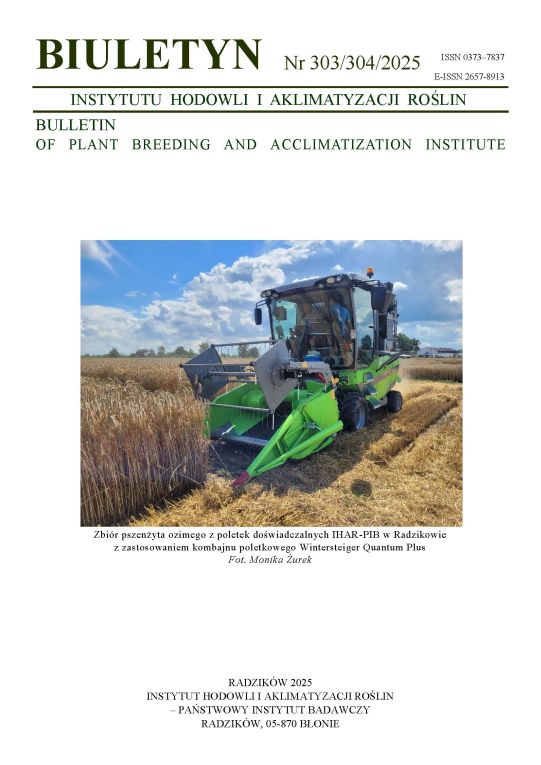Split-split-plot design for a non-orthogonal experiment with lupine
Katarzyna Ambroży-Deręgowska
sekretariat.kmmis@up.poznan.plKatedra Metod Matematycznych i Statystycznych, Uniwersytet Przyrodniczy w Poznaniu (Poland)
Iwona Mejza
Katedra Metod Matematycznych i Statystycznych, Uniwersytet Przyrodniczy w Poznaniu (Poland)
Abstract
In the paper a construction method of an incomplete split-split-plot (SSP) design for a non-orthogonal experiment is presented. Incompleteness of the SSP design concerns sub-subplot treatments. Balanced incomplete block (BIB) design is used as generating design in the construction method. Statistical properties of the final SSP design with respect to general balance are given. Multistratum analysis and the analysis of contrasts are proposed as adequate statistical analysis. Considerations are illustrated using data generated from some orthogonal experiment with lupine.
Keywords:
basic contrasts, incomplete split-split-plot design, multistratum analysisReferences
Ambroży K., Mejza I. 2006. Doświadczenia trójczynnikowe z krzyżową i zagnieżdżoną strukturą poziomów czynników. Wyd. Polskie Towarzystwo Biometryczne i PRODRUK, Poznań.
Google Scholar
Ambroży K., Mejza I. 2009. Analiza danych z krzyżową i zagnieżdżoną strukturą poziomów czynników na przykładzie doświadczenia z łubinem. Biul. IHAR 251: 269 — 281.
Google Scholar
Ambroży K., Mejza I. 2012. Modelowanie danych z doświadczeń trójczynnikowych zakładanych w układach zależnych o różnych strukturach blokowych. Biul. IHAR 264: 23 — 31.
Google Scholar
Ambroży K., Mejza I. 2013. A method of constructing incomplete split-split-plot designs supplemented by whole plot and subplot standards and their analysis. Colloquium Biometricum 43: 59 — 72.
Google Scholar
Ambroży-Deręgowska K., Mejza I. 2014. Niektóre aspekty statystyczne planowania doświadczeń nieortogonalnych typu split-split-plot. Biul. IHAR, 274: 41 — 49.
Google Scholar
Ambroży-Deręgowska K., Mejza I., Mejza S. 2014. On the relative efficiency of split-split-plot design to split-plot × split-block design. Colloquium Biometricum 44: 69 — 78.
Google Scholar
Ambroży-Deręgowska K., Mejza I., Mejza S. 2015. Stratum analyses for split-split-plot designs generated by group divisible designs. Colloquium Biometricum 45: 47 – 65.
Google Scholar
Barbacki S. 1951. Doświadczenia kombinowane. PWRiL, Warszawa.
Google Scholar
Clatworthy W. H. 1973. Tables of two associate classes partially balanced designs. NBS App. Math. Ser. 63, Department of Commerce.
Google Scholar
Cochran W.G., Cox G.M. 1957. Experimental designs. Wiley, New York.
Google Scholar
Nelder J. A. 1965 a. The analysis of randomized experiments with orthogonal block structure. 1. Block structure and the null analysis of variance. Proc. Roy. Soc. London Ser. A 283: 147 — 162.
Google Scholar
Nelder J. A. 1965 b. The analysis of randomized experiments with orthogonal block structure. 2. Treatment structure and general analysis of variance. Proc. Roy. Soc. London A 283: 163 — 178.
Google Scholar
Authors
Katarzyna Ambroży-Deręgowskasekretariat.kmmis@up.poznan.pl
Katedra Metod Matematycznych i Statystycznych, Uniwersytet Przyrodniczy w Poznaniu Poland
Authors
Iwona MejzaKatedra Metod Matematycznych i Statystycznych, Uniwersytet Przyrodniczy w Poznaniu Poland
Statistics
Abstract views: 201PDF downloads: 127
License
Copyright (c) 2015 Katarzyna Ambroży-Deręgowska, Iwona Mejza

This work is licensed under a Creative Commons Attribution-ShareAlike 4.0 International License.
Upon submitting the article, the Authors grant the Publisher a non-exclusive and free license to use the article for an indefinite period of time throughout the world in the following fields of use:
- Production and reproduction of copies of the article using a specific technique, including printing and digital technology.
- Placing on the market, lending or renting the original or copies of the article.
- Public performance, exhibition, display, reproduction, broadcasting and re-broadcasting, as well as making the article publicly available in such a way that everyone can access it at a place and time of their choice.
- Including the article in a collective work.
- Uploading an article in electronic form to electronic platforms or otherwise introducing an article in electronic form to the Internet or other network.
- Dissemination of the article in electronic form on the Internet or other network, in collective work as well as independently.
- Making the article available in an electronic version in such a way that everyone can access it at a place and time of their choice, in particular via the Internet.
Authors by sending a request for publication:
- They consent to the publication of the article in the journal,
- They agree to give the publication a DOI (Digital Object Identifier),
- They undertake to comply with the publishing house's code of ethics in accordance with the guidelines of the Committee on Publication Ethics (COPE), (http://ihar.edu.pl/biblioteka_i_wydawnictwa.php),
- They consent to the articles being made available in electronic form under the CC BY-SA 4.0 license, in open access,
- They agree to send article metadata to commercial and non-commercial journal indexing databases.
Most read articles by the same author(s)
- Katarzyna Ambroży-Deręgowska, Iwona Mejza, Some statistical aspects of the planning of non-orthogonal experiments of split-split-plot type , Bulletin of Plant Breeding and Acclimatization Institute: No. 274 (2014): Regular issue
- Katarzyna Ambroży-Deręgowska, Tadeusz Łuczkiewicz, Katarzyna Marczyńska, Iwona Mejza, Stanisław Mejza, Comparison of methods for selection of spring barley genotypes based on non-replicated experiments , Bulletin of Plant Breeding and Acclimatization Institute: No. 274 (2014): Regular issue
- Katarzyna Ambroży, Iwona Mejza, Data analysis with crossed and nested treatment structures based on example of experiment with lupine , Bulletin of Plant Breeding and Acclimatization Institute: No. 251 (2009): Regular issue
- Katarzyna Ambroży, Iwona Mejza, Modeling data from three-factor experiments with split units set up in designs with different block structures , Bulletin of Plant Breeding and Acclimatization Institute: No. 264 (2012): Regular issue
- Tadeusz Łuczkiewicz, Stanisław Mejza, Hanna Kiełczewska, Iwona Mejza, Some remarks on the analysis of variance for diallel cross experiments , Bulletin of Plant Breeding and Acclimatization Institute: No. 240/241 (2006): Regular issue













